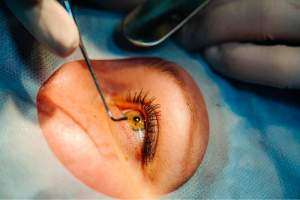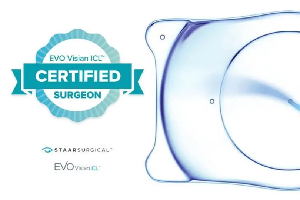Implantable Collamer Lens (ICL) surgery is a type of refractive surgery that involves the implantation of a special type of intraocular lens (IOL) inside the eye to correct refractive errors such as myopia (nearsightedness), hyperopia (farsightedness), and astigmatism. Unlike traditional LASIK or PRK procedures, ICL surgery does not involve the removal of corneal tissue. Instead, it involves the insertion of a lens between the natural lens and the iris, preserving the cornea.
Here is an overview of the key aspects of ICL surgery:
Lens Design:
The ICL is a biocompatible lens made of a material called Collamer, which contains collagen and other materials that are compatible with the eye. This lens is designed to work with the eye’s natural optical system.
Refractive Errors Corrected:
ICL surgery is primarily used to correct moderate to high degrees of myopia, hyperopia, and astigmatism. It is often considered for individuals who may not be suitable candidates for traditional laser eye surgery methods due to thin corneas or other factors.
Preservation of Corneal Tissue:
Unlike LASIK and PRK, which involve reshaping the cornea, ICL surgery does not remove corneal tissue. This can be beneficial for individuals with thin corneas or those at a higher risk of developing dry eyes.
Biocompatibility:
The Collamer material used in the ICL is known for its biocompatibility, meaning it is well-tolerated by the eye and generally does not cause irritation or discomfort.
Quick Recovery:
Patients often experience a relatively quick recovery after ICL surgery. Visual improvement is usually noticeable soon after the procedure.
Reversibility:
One notable aspect of ICL surgery is that the procedure is reversible. If necessary, the ICL can be removed, allowing the patient’s vision to return to its pre-surgery state.
Postoperative Care:
Patients are typically prescribed eye drops to prevent infection and control inflammation. Follow-up appointments are scheduled to monitor the healing process and ensure optimal visual outcomes.



After Implantable Collamer Lens (ICL) surgery, patients can expect a period of recovery and adjustment as their eyes heal. Here’s a general overview of what happens after ICL surgery:
Immediate Postoperative Period:
Visual Improvement: Many patients experience an immediate improvement in vision after ICL surgery. However, it’s normal to have some blurriness or haziness initially.
Light Sensitivity: Some sensitivity to light may be experienced, and wearing sunglasses can help alleviate discomfort.
Recovery at Home:
Rest: Resting for the first day or two after surgery is usually recommended. Activities that strain the eyes, such as reading or using electronic devices for extended periods, should be limited.
Follow Postoperative Instructions: Patients are given specific postoperative instructions, including the use of prescribed eye drops to prevent infection and control inflammation. It’s crucial to follow these instructions diligently.
Follow-up Appointments:
First Few Days: Patients typically have a follow-up appointment within the first few days after surgery to assess the healing process and ensure there are no complications.
Additional Follow-ups: Depending on the surgeon’s recommendations, there may be additional follow-up appointments in the weeks following the surgery to monitor progress.
Return to Normal Activities:
First Week: Many patients can resume normal daily activities within a week after ICL surgery, although strenuous activities and heavy lifting may still be restricted for a short period.
Avoid Rubbing Eyes: Patients are advised to avoid rubbing their eyes during the early stages of recovery.
Vision Stabilization:
First Month: Vision usually continues to improve during the first month, with the majority of patients experiencing significant clarity by this time.
Adaptation: Some patients may experience an adaptation period as their eyes adjust to the presence of the ICL.
Long-Term Follow-up:
Stabilization of Vision: While vision often improves rapidly after ICL surgery, it may continue to stabilize over several weeks to a few months.
Regular Eye Exams: Regular eye examinations are recommended to monitor the long-term health of the eyes and ensure the stability of vision.
Potential Adjustments:
Enhancements: In some cases, patients may require enhancements or adjustments to fine-tune their vision. This is less common with ICL surgery compared to some other refractive procedures.
Collamer Lens Surgery, also known as Implantable Collamer Lens (ICL) surgery, is a procedure designed to correct vision problems such as nearsightedness (myopia), and in some cases, astigmatism. Mr Deshmukh, an eye surgeon, may emphasize several benefits associated with this surgical procedure:
Highly Effective Correction:
ICL surgery offers highly effective vision correction for individuals with moderate to severe nearsightedness. It can provide excellent visual outcomes, often resulting in clearer and sharper vision.
Preservation of Corneal Tissue:
Unlike some other vision correction procedures such as LASIK, ICL surgery does not involve reshaping the cornea. Instead, the Collamer Lens is inserted inside the eye in addition to the natural lens, leaving the cornea untouched. This preservation of corneal tissue can be beneficial for individuals with thin or irregular corneas.
Reversibility and Adjustability:
The procedure is reversible, meaning the Collamer Lens can be removed if necessary. Additionally, if a patient’s vision changes over time, the lens can be exchanged or adjusted to accommodate these changes.
High Biocompatibility:
Collamer, the material used in the lens, is biocompatible and well-tolerated by the body. It contains collagen, making it similar to natural eye tissue and reducing the likelihood of causing discomfort or irritation.
Quick Recovery:
Patients often experience a relatively quick recovery following ICL surgery. Many individuals notice improved vision shortly after the procedure and can resume normal activities within a short period.
Suitable for Candidates Unsuitable for LASIK:
ICL surgery can be an excellent alternative for individuals who are not suitable candidates for LASIK due to thinner corneas, higher levels of refractive error, or other factors.
Excellent Visual Quality:
The Collamer Lens provides excellent optical quality, resulting in improved contrast sensitivity and reduced risk of inducing visual aberrations like glare or halos at night.
Mr Deshmukh may discuss these benefits with patients considering ICL surgery, highlighting how this procedure can offer a safe and effective solution for vision correction. However, it’s essential for individuals to have a thorough evaluation by an eye care professional to determine their eligibility for ICL surgery and to discuss the potential risks and benefits specific to their eye health condition.
1. What is Collamer Lens Surgery, and how does it differ from LASIK?
Collamer Lens Surgery, also known as ICL (Implantable Collamer Lens) surgery, involves implanting a corrective lens inside the eye to address nearsightedness. Unlike LASIK, which reshapes the cornea, ICL surgery inserts a lens, preserving the corneal tissue and making it a suitable option for individuals with thinner or irregular corneas.
2. Am I a suitable candidate for Collamer Lens Surgery?
Ideal candidates for Collamer Lens Surgery are typically those with moderate to severe nearsightedness, thin corneas, or those who are not suitable candidates for LASIK. A comprehensive eye examination will determine your eligibility for this procedure.
3. Is Collamer Lens Surgery safe?
Yes, Collamer Lens Surgery is considered safe and has been performed successfully for many years. The Collamer material used in the lens is biocompatible and well-tolerated by the body, reducing the risk of adverse reactions.
4. What is the recovery process like after Collamer Lens Surgery?
Recovery after Collamer Lens Surgery is usually quick. Patients often notice improved vision shortly after the procedure. Most individuals can resume normal activities within a short period, with minimal discomfort.
5. Can the Collamer Lens be removed or adjusted if needed?
Yes, the Collamer Lens used in ICL surgery is reversible and can be removed or exchanged if necessary. Additionally, if your vision changes over time, the lens can be adjusted or replaced to accommodate these changes.










